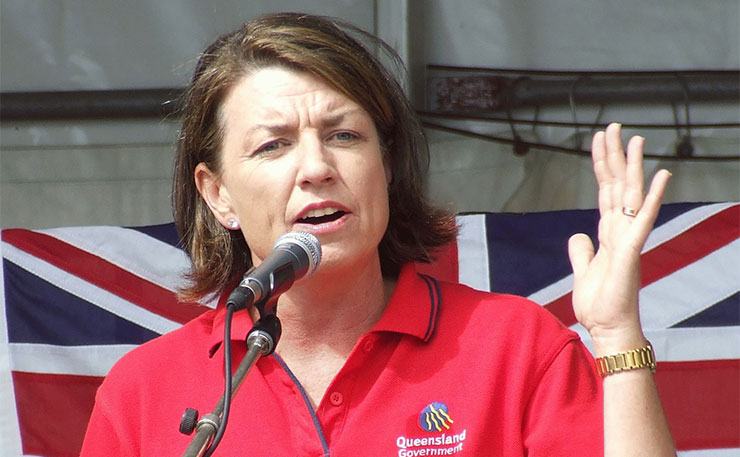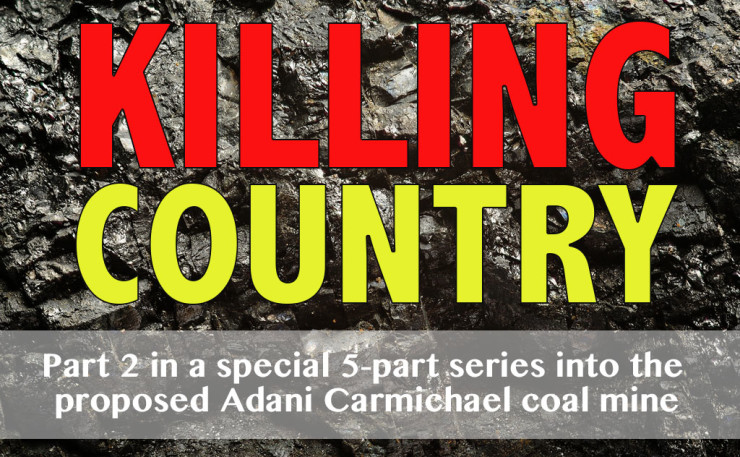A key issue in the upcoming Queensland election issue is the Adani coal mine, a massive project slated for development in the Carmichael basin north west of Brisbane. To ensure it happens, the Queensland Government is threatening to compulsory acquire land from the local Traditional Owners. In the second in a five part series, Kristen Lyons explains.
When Adani purchased the coal tenement for its proposed Carmichael mine in 2010, then Premier Anna Bligh declared the proposed mine and related infrastructure project could generate more than 11,000 jobs and lucrative economic returns for Queenslanders.
The rhetoric about the Adani Carmichael mine, coming in turn from the Newman, and later Palaszczuk Governments, however, has always been about more than simply more jobs and more growth.
The Galilee Basin has been lauded as Queensland’s last coal frontier. The region has been described as the most prospective area outside that currently being mined – and on this basis has seen successive Queensland Governments establish policy settings and financial breaks, as well as expedite approval processes and champion pro-mining rhetoric, to drive a state-led enclosure of Aboriginal and pastoral lands to ‘open up’ the Galilee Basin for coal mining.
And for Adani, this constitutes a ‘land grab’ of Wangan and Jagalingou Country. While Wangan and Jagalingou people are pulled in multiple directions by competing interests, the Wangan and Jagalingou Traditional Owners Council (W&J) have asserted sustained opposition to Adani’s proposed mine.
Despite their resistance, and a tireless campaign built around a defense of the right to say no, the Queensland Government has failed to even acknowledge W&Js opposition to the mine, a position simply incongruent with their coal extraction agenda for the region.
Instead, the Queensland Government has walked over Indigenous rights in its efforts to secure W&J country, and to open up the Galilee Basin for the final frontier in a long history of often violent extractivism.

Our research exposes some of the direct and covert manoeuvres of the Queensland Government in sidelining the rights of Traditional Owners to make way for Adani’s mines. And given the current elevation of the Adani mine as a totemic issue in the Queensland election, W&J have outlined clear demands for the voting public to expect from the Queensland Government.
Opening Up the Galilee – The latest Colonial Frontier
The Galilee Basin covers an area of 247,000 square kilometres in Central Western Queensland, and is touted as becoming the largest coal-producing region in Queensland – ‘Bowen Basin on steroids’ – and one of the largest coal basins in the world. For the ‘extractivist state’ of Queensland, in which coal mining is an unquestionable precondition for ‘development’, the Galilee Basin has quickly become a key state development agenda.
Notwithstanding the global renewable energy transition underway, and the great threat of carbon pollution and climate change posed by increased coal burning, for Government in Queensland it is simply too good, and too big, to resist.
Over at least the last decade, Queensland politics and policies across successive governments have committed to “opening up the Galilee”. In so doing, they have held inconsistent positions on Traditional Owners’ rights, and have maneuvered around or overridden them where these stand in the way of the State interest to expand this last colonial frontier.
This agenda is emphatically captured in the Galilee Basin Development Strategy, jointly released by then Premier Newman and Deputy Premier Seeney in 2013. This Strategy set out to discount royalties paid by mining companies, streamline land acquisition and fast track planning approvals.
Of significance, it enabled compulsory acquisition of land, including of native title rights and interests, to make way for mining. The legacy of this strategy lives on with the Palaszczuk Government, who have offered a highly controversial ‘royalty deal’ for Adani, the details of which are shrouded, ironically, behind an opaque ‘transparency policy framework’. And the threat of compulsory acquisition of W&J’s rights and interests in their Country has sat behind their many failed attempts to gain ‘the consent’ of the Traditional Owners.

The then Premier Campbell Newman described the strategy as positioning the State’s resources sector as “one of the four pillars of the Queensland economy”. Lending further support to the strategy, in 2014 the Newman Government designated the Galilee Basin State Development Area (SDA) – an area covering over 100,000 hectares, encompassing nearly all of the W&J traditional lands, and dwarfing the other nine state development areas, which average 9,000 hectares each, by comparison.
The Galilee Basin SDA proposes broad Government facilitated infrastructure development and expansion, including railways and a coal port. This, along with a range of other policy drivers, all point to State Government’s controlling hand in providing the jurisdiction to open up the Galilee.
Queensland Government Backs Adani
With the State government clearing the path, at least nine so-called ‘mega mine’ proposals have been slated for the Galilee Basin, including the Alpha Coal project – owned jointly by Gina Rinhart’s Hancock Prospecting and Indian conglomerate, GVK – and Clive Palmer’s Mineralology. These are at various stages, but none are off the drawing board.
Adani, however, has risen from this pack to become the first to achieve most approvals (amidst a series of legal appeals). But of significance, it has not been able to secure a registered Indigenous Land Use Agreement (ILUA) with Traditional Owners. This agreement would provide the basis for unencumbered access rights to land for their mine via the extinguishment of native title and conversion of the land to freehold tenure.
This is a requirement for the critical infrastructure for Adani’s mine operations and remains the outstanding approval that continues to hold up the Carmichael mine.
Amidst a crowd of coal carpet baggers, the Queensland Government (alongside the Federal Government) has lent strong support to Adani, an alliance that has assisted the industrial giant to secure almost all legal approvals.
The Queensland Government’s backing of Adani relates, in part, to the opportunity afforded by Adani’s vertical integration that would enable development from ‘pit to port to power point’; thereby establishing the key infrastructure that other mining companies could access.
Demonstrating this integration across the coal life cycle: Adani acquired the Abbot Point coal terminal port from the Queensland Government in 2011; this was followed by the purchase of Moray Downs cattle property in 2012 – a third of which sits over Adani’s coal deposit; and it gained approvals in 2014 to construct a 300 kilometre rail line to connect the mine to the port.
While the Federal Government was set to bankroll this railway via the Northern Australia Infrastructure Facility (NAIF), this is now uncertain given the Queensland Government’s election campaign announcement to veto the NAIF loan. In short, Adani has secured many pieces of the puzzle to lock in its vertically integrated coal mega project.
With Adani singled out, the Queensland Government has established policy settings and expedited approvals to leverage the interests of Adani. Specifically, the State Government granted environmental authority in 2016, despite a series of legal appeals that exposed the impacts of the mine on groundwater and biodiversity, the burning of coal for climate change, and the non-economic viability of the mine.

The government also created special exemptions for Adani’s water license, including granting unlimited water access, by re-writing the State Water Act the same year.
Queensland Minister for State Development and Natural Resources and Mines, Anthony Lynham, also expedited mining lease approvals, issuing these in April 2016. This was despite Minister Lynham’s earlier written confirmation to W&J that he intended to await the legal outcome of their Judicial Review of the decision of the Native Title Tribunal.
To do otherwise was understood as reckless politics; given the determination of W&J’s legal challenge could put the leases at risk, as well as deny natural justice for Traditional Owners to have their case heard in court.
Premier Palaszczuk took personal ownership for the decision, and heralded the achievement as moving the mine’s realization one step closer.
The State Government’s support for Adani dovetails with its close ties with the company, and reflected in its sharing of operatives. This includes Cameron Milner’s role as both Labor advisor and staffer with Adani’s key lobbying firm, Next Level Strategic Services. It also includes Milner’s colleague at Next Level Strategic Services, David Moore, who also worked as chief of staff to Deputy Premier Jeff Seeney – a key proponent of the Galilee Basin Development Strategy – and prior to this, as chief of staff in the Howard Government.
Former senior media advisor to Mr Seeney, Kate Haddan, has also been appointed to Adani’s communications team, and regularly appears as an Adani spokeswoman.
That many legal challenges have been overcome by Adani and the State so far, is not a measure of the lack of merit of the cases, so much as confirming that the system is designed to expedite mining over Indigenous peoples’ rights or concerns for the sustainability of natural resources, and the global impacts of climate change.
W&J’s cases are at the forefront of arguments for reform in these areas. W&J is very clearly challenging both the merits of the process and, in the case of the native title regime, the fundamentals of a system that is ultimately inconsistent with ensuring free prior informed consent of Traditional Owners before a project of such destructive scope can proceed.
Threats to Extinguish Native Title
The Newman Government’s declaration of the Galilee Basin State Development Area in 2014 – encompassing the corridor from Abbot Point to the proposed mine site – has provided a policy pathway to establish Adani’s proposed project. This was further supported by designation of the Carmichael coal mine and north Galilee Basin Rail Project as critical infrastructure and a prescribed project under state development.
The significance of this cannot be overstated. In the face of Traditional Owner opposition, the State Development Area designation provides a statutory mandate for compulsory acquisition of land and subsequent extinguishment of native title.
While this action may have been intended by Newman’s LNP Government, they did not execute the move before being ousted from Government in 2015.
However, deputy Premier Seeney’s staffer, Barry Broe, has played a key role in continuing the LNP agenda in the incoming Labor Government. On the back of a controversial five-year employment contract struck by the Newman Government before going into the election, Broe was helicoptered in as coordinator-general to the Palaszczuk government. In this role, and under the imprimatur of Minister Lynham, Barry Broe has played handmaiden to LNP’s original Strategy, the outcome of which has included the threat to forcibly acquire W&J Country if Traditional Owners are unable to reach ‘agreement’ with Adani.
While there have been a number of cases where the coordinator-general has drawn upon these statutory powers to extinguish native title, the Adani case is different; it would be the first case of compulsory acquisition in Queensland for the benefit of private interests that was against the wishes of Traditional Owners.
It would not serve the political interests of the Labor Government to engage this direct assault on Traditional Owner rights, especially while Adani continues to fail in its bid to secure funding for its mine.
Such a move is also likely retrograde given recent national polling shows that close to two thirds of Australians don’t think the mine should proceed without the consent of Traditional Owners.
Manufacturing Consent
Despite the statutory option to undertake compulsory acquisition of W&J Country, the State Government has instead sought to manufacture Indigenous consent for the takeover of country by the Carmichael mega mine.
The Coordinator General shifted focus in late 2015 to a renewed attempt, with Adani, to secure a land use agreement in the face of continuing opposition.
Perhaps this circuitous path for a land grab is considered to be more palatable to voters?
Central to Indigenous consent is an Indigenous Land Use Agreement (ILUA). The convergence of Adani and the State Government in manufacturing the agreement process, however (details we chart in a forthcoming article in this special series) leads W&J spokesperson Murrawah Johnson to provocatively assert that compulsory acquisition might be “a more honest and up front way of walking over our rights”.
An Indigenous Land Use Agreement, or ILUA, requires mining companies and Traditional Owners to reach agreement on the management and use of stipulated land and waters, as well as detailing employment, compensation, cultural heritage and other issues. The ILUA process, in effect, enables the State Government to abrogate its responsibilities to mining companies in negotiations with Traditional Owners, despite the obvious unequal access to power and information that shapes both negotiation processes and their outcomes.
The deals are often meagre and of little benefit in addressing the profound inequity issues for Indigenous peoples, even if the headline numbers seem large.
Despite three separate claim group meetings spanning over four years, where W&J has rejected an ILUA with Adani, an agreement was signed in 2016. Yet the meeting, and the ILUA it posits, is shrouded in controversy, raising serious and as yet unresolved questions about its legitimacy.
Amongst claims tabled in court are Adani’s undisclosed payment of sitting fees to some breakaway applicants, the mining company bussing in hundreds of people who are not rightful Traditional Owners to ‘authorise’ an ‘agreement’ that they had no involvement in, as well as giving instructions to paid security staff to prevent W&J spokesperson Adrian Burragubba from attendance.
One representative of the applicant, Craig Dallon, has also withdrawn his support amidst concerns that Traditional Owners were not appropriately advised of the impacts that would arise from the contents of the ILUA.
On the basis of such concerns, this agreement has been the basis of a number of legal challenges, including an outstanding case that will be heard in March 2018.
At every step of the ILUA process, the Queensland Government has played a key role in masking or denying Traditional Owner dissent to secure ‘consent’ as the basis for Adani’s Carmichael mine to proceed. This is despite W&J writing to the Premier to clarify its position in opposition to the mine, and launching their campaign outside Parliament House in March 2015.
This occurred after Adani had sought Native Title Tribunal orders to override the decision of the W&J people to reject a land use agreement, a move also supported by Government.
The State Government has failed to acknowledge the outcome of W&J’s bone fide claim group meetings where opposition to the ILUA has been formalised or meet with the Council’s representatives.
Two of these meetings predate both the contested ILUA and the issuing of the mining leases by the Queensland Government.
It is a fact that the leases were issued without consent. It has been necessary ever since, that a ‘land use agreement’ be obtained to complete the process and avoid the final compulsory extinguishment of native title.
That battle goes on, in the courts and in the political arena.
Adani A Totemic Election Issue
Adani is a key player in the Queensland Government’s strategy for extractivist development of the Galilee Basin. Yet a significant legal hurdle stands in the way of opening up this last coal frontier: W&J do not consent to the destruction of their country for the mine’s go ahead. Unlike other Traditional Owners from country where the port and proposed railway are situated, and where ILUAs have been reached, W&J refuse to give away rights to their country, even in the face of a relentless pursuit by Adani.
They face a scale of destruction of their lands, waters and heritage that allows no compromise.
As this plays out in the Queensland election, where Adani has been elevated as a totemic issue, the W&J continue to press their case. In the face of a system designed to deliver a mining outcome irrespective of whether Traditional Owners ultimately consent or not, they have laid out five key demands for the voting public.
They have called for the Queensland Government to:
- Acknowledge there is no genuine consent for the mine from Traditional Owners
- Get its signature off the contested Adani ‘land use agreement’
- Rule out reliance on extinguishment of native title to allow the mine to proceed
- Stop opposing the W&J people in the courts, including vacating the Federal court action on the ILUA
- Stop spending or facilitating the use of public funds to enable the mine and the destruction of W&J country and heritage
The W&J Traditional Owners Council, on behalf the many families and Traditional Owners who have always opposed the mine and have had their lack of consent overridden regardless, is maintaining its resolve.
Their recent ‘gathering on country’ confirmed their commitment to resist the State’s imposition of a coal frontier on their ancestral lands and waters; they see the Government as the prime mover – as the force that has always been the chief agent in their dispossession and denial of their rights.
But as W&J Traditional Owner leader Adrian Burragubba has declared, they are confident that in time they will win, because all governments must eventually accept the truth of land justice for Aboriginal peoples in Australia.
Donate To New Matilda
New Matilda is a small, independent media outlet. We survive through reader contributions, and never losing a lawsuit. If you got something from this article, giving something back helps us to continue speaking truth to power. Every little bit counts.





